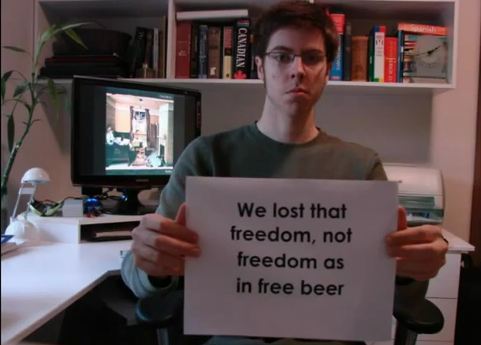
Facebook bans employers from snooping on job seekers' profiles
Reports of prospective employers asking for Facebook passwords during the hiring process or as terms of employment has the social networking site upset. Facebook says asking for your password is a violation of privacy, and very well could set up the employer for legal action.
Criticism of the practice came to a head earlier this week following an Associated Press story detailing several individuals who had been subjected to disclosing their passwords to either obtain or to keep a job. Employers' attempts to peer into your social life has the attention of lawmakers too: in both Maryland and Illinois legislation is being considered to make the practice illegal.

You can trust Google to spy on you
Google's new privacy policy takes effect today, March 1. There are significant changes on how your data is handled across the Google family of sites, and that's enough to raise the concern of privacy regulators in both the European Union and Japan.
Their concern should be yours, too. Who's that looking over your shoulder online? Google.

Google gets caught with its hand in the cookie jar
Are you shocked that Google is back in the news again for behaving badly? This latest "evil" is hard to excuse as being accidental. Several online advertising outfits, including Google, ignored the privacy settings of iPhone users and embedded tracking code in mobile advertisements, the Wall Street Journal finds. The code allowed Google and others to track browsing behavior across many different websites. Supposedly Google stopped the practice after being contacted by the Journal.
The browser breach raises important questions about the search and information giant's commitment to user privacy, and more importantly the lengths the company will go to build its advertising business. Considering that the Mountain View, Calif.-based company made such a big deal in its early years that "you can make money without doing evil", each successive report of Google acting just like any other company is ever more disturbing.

We need new privacy policies for a new world
In a major update to its privacy policy and the addition of "Search Plus Your World", Google has managed to attain the consensus from the tech-enthused world that it is way beyond the innocent baby days of "don’t be evil". Matt Honan of Gizmodo signalled the privacy shift as the end of Google’s "don’t be evil" promise, which the company built its business on, and Sarah Lacy of Pando Daily shared similar sentiments, though hers was related to the Search Plus Your World outcry.
In a nutshell, one of the biggest sore points that people are having with Google’s new privacy policy is the fact that it permits the search giant to utilize your basic profile information and extend it across your identities when using your other Google services. These changes aren't so much evil, but adaptation to our merging online and offline identities.

Google+ names policy goes just far enough
There are lots of places where you can be anonymous online. Google+ isn't one of them. Late today, Google announced a revision to the G+ names policy that doesn't change this, but it does allow people to use nicknames and established pseudonyms. If anonymity is your thing, go somewhere else. I don't want you on Google+. You can bully pulpit somewhere else. As for those folks whose lives might be at risk for using real names, please be safe someplace else -- Facebook, Reddit, Twitter, Tumblr or WordPress, for example. Those services have proven they can protect your identity.
But, of course, the griping will continue from the Internet rabble determined to hide their identities everywhere. They want more from Google than just nicknames. What are you afraid of? I use my real name everywhere, as I have always done. I see that as being in the very spirit of the open -- and transparent -- Internet. Be who you are, not someone else. And if that comment --- or other online interaction -- requires you to hide your identity, shut the frak up. Vent somewhere else. For everyone else, and this includes people who have built up alternative identities, Google+ welcomes you.

Will your website go dark to protest SOPA?
Jan. 18, 2012 is designated SOPA blackout day, with prominent websites planning to go dark in protest of two bills working through Congress -- Stop Online Piracy Act and PROTECT IP Act (PIPA). If you've got a big school project due Thursday and plan on using Wikipedia, get your research done today. The community-based encyclopedia plans to go dark tomorrow, and it's not alone.
The proposed legislation has generated gigabytes of negative responses, which included a Go Daddy boycott for supporting SOPA (since retracted) and culminates in tomorrow's blackout. Two months ago, I posed poll: "US Congress is considering two new copyright bills: PROTECT IP and Stop Online Piracy Act. Do you support them?" More than 3,500 responses later, 95 percent answered "No". You're not alone.

Zappos hack exposes personal information of 24 million customers
Data on up to 24 million customers of online shoe retailer Zappos was compromised according to an email sent by its CEO Tony Hsieh on Sunday. While Hsieh says that full credit card information is safe, hackers may have the last four digits of the cards.
Hackers accessed names, email addresses, physical addresses, and phone numbers. Passwords were also compromised, however in encrypted form. As a result, the company sent out an email to all its customers, advising them to change their passwords as a protective measure. Zappos is also asking customers to reset their passwords elsewhere where it may be the same.

10 years after Bill Gates' Trustworthy Computing memo: What it meant for Microsoft and why every tech company needs one
I joined the Microsoft Security Response Center (MSRC) in April 2001 and left the company in December 2010. During that time I was involved in security and privacy at Microsoft, culminating in my role handling worldwide crisis communications for security and privacy incidents. I am one of a handful of people who knows what the security world was like at Microsoft before Chairman Bill Gates' Trustworthy Computing memo on Jan. 15, 2002. I was also part of the growth and transformation that memo brought about over the years.
As Microsoft marks the tenth year anniversary of that memo, it seems a good time to share a former insider’s view of what it really meant and accomplished. As well, I'll share thoughts on why, in the next 10 years, it’s critical that other technology companies follow Gates’ lead.

Privacy group demands FTC investigate Google search changes
The chorus of opposition to Google's recent search changes grows louder, with Electronic Privacy Information Center urging the Federal Trade Commission to launch an investigation into whether or not Google is violating users' privacy with the new feature.
Google settled with the FTC in March over its failed Buzz service, submitting to privacy audits for a period of 20 years as a result. EPIC is specifically concerned with personal data, photos, posts, and contact details being included in search results.

Who's dumping Go Daddy to protest SOPA?
Tomorrow is "Dump Go Daddy Day", not that many of you waited, based on your comments. For those considering to show their outrage at the registrar for active SOPA support (since withdrawn), it might be helpful to see what others are doing, where they're taking domains and exact reasoning for kicking Go Daddy down the hill.
But first, I must say that negative response to yesterday's Go Daddy/SOPA post surprised me. My some of you really are outraged. What I don't understand: Why focus all that anger on Go Daddy, or any other SOPA supporter, when legislators in the House and Senate who proposed the Stop Online Piracy Act, and sibling PROTECT IP ACT (PIPA), have the power to pass a bill into law? Wouldn't boycotting them make more sense? Or letting President Obama know how you would feel about him signing rather than vetoing the legislation? We are entering a big election year in just a few days, after all.

'I remember when the Internet was free'
Stop Online Piracy Act, or SOPA, is churning up increasing debate as the holidays approach. There's irony here. The very public response about SOPA is freedom the bill, or its Senate sibling PROTECT IP, could take away. Dan Bull's "SOPA Cabana" YouTube music video is example of the grassroots response to the proposed legislation. YouTube is one of the services SOPA would target, likely diminishing freedom of expression like Bull's. The headline to this post comes from his video.
To recap, Senators introduced PROTECT IP in May and House representatives did likewise with SOPA in October. Either bill would give the government broad powers to take down websites, seize domains and compel search engines from indexing these properties. Little more than a request from copyright holders is necessary. It's essentially guilty-until-proven-innocent legislation that would punish the many for the sins of the few, while disrupting the fundamental attributes that made the Internet so successful and empowered so many individuals or businesses to accomplish so much. (Review the bills: PROTECT IP. SOPA.)

Protect your personal info with Identity Finder
User names, passwords, credit card numbers, personal details: your PC may contain all kinds of personal data, easily accessible to malware or anyone with physical access to the system. You know this already, of course, which is why you probably protect your system with a firewall, antivirus package, maybe an encryption tool and more.
But what you maybe don’t know for sure is exactly how much data might be exposed on your system, should an attacker actually be able to penetrate your defences. And that’s where Identity Finder comes in. Tell the free version of the program to scan your system and it will immediately identify any passwords that might be stored by your browsers, for instance. You can then selectively delete all or just the most sensitive of these, and perhaps turn off password storage entirely if it seems too risky.

Does your phone have Carrier IQ? Now you can know
I offer a hat tip to Gizmodo, which has put together a list of smartphones that have Carrier IQ. The company disclosed the information as part of a US Senate inquiry. Sprint subscribers are the most likely to have the spyware installed -- 26 million, or nearly half of them. Verizon: None. The information is also available in a statement from Sen. Al Franken (D-Minn.), just not as quickly scannable.
But not all phones where Carrier IQ is installed have it active. Android developer Trevor Eckhart uncovered Carrier IQ last month, offering detailed explanation how the rootkit-like software works. I followed his instructions to see if the software was active on my Samsung Galaxy S II Skyrocket, and it appeared not to be. Days later I installed Carrier IQ detectors from BitDefender and LookOut Labs, which found the software but didn't indicate its status. Apparently, Skyrocket is one of the phones where Carrier IQ is installed but not active. Same is true of HTC Vivid, AT&T's other LTE phone.

FBI denies FOIA request about its alleged use of Carrier IQ
Carrier IQ is once again making headlines, this time over reports that it is giving information to law enforcement. Complicating matters more, the FBI denied a Freedom of Information Act (FOIA) request last week asking about its own use of Carrier IQ technology, saying the release of such documents "could reasonably be expected to interfere with law enforcement proceedings".
The FBI's admission in the letter that documents do exist raises concerns that Carrier IQ is using its technologies more than just for customer experience purposes, but actual spying as it is being accused of by many pundits. The company is moving quickly to quell this latest round of criticism.

What the hell is SOPA? [infographic]
All kinds of unsolicited mail pours into my inbox, and I ignore about half the stuff that probably matters -- that's if the Junk Mail filter doesn't grab it first. I'm particularly leery of messages promoting an infographic made by some organization that might have vested interest in the topic. But this one, from BusinessInsuranceQuotes, depicts such an emotionally-heated topic, I figured: "Oh, what the hell, just post the damn thing".
Feast your eyes on this little ditty about SOPA -- the Stop Online Piracy Act -- that I repeatedly mistype as "privacy", subconscious response meaning to invade it, perhaps. The infographic really lacks the drama SOPA would create if enacted as law. Little things like empowering the government to take down your site or seize your domain based on the presumption of guilt. That's the painless part. You go to jail if convicted. Perhaps Federal prisons aren't as overcrowded as California jails.